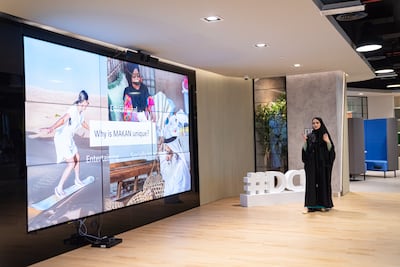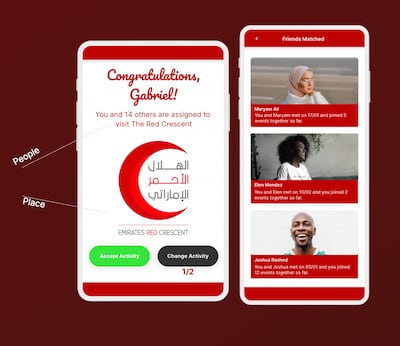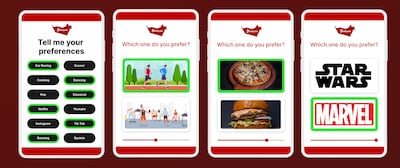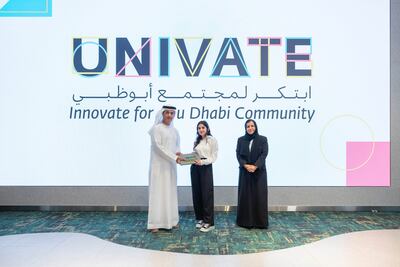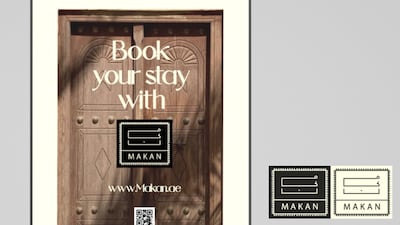A young app developer is hoping to share the Emirati way of life with the world.
The app, called Makan, allows users to book a stay in traditional homes and farms in the UAE. Still in its design stage, it was developed by Zayed University student Khawla Abdullatif Alhammadi and aims to connect residents and tourists with Emiratis who are keen to share their culture and their homes.
It was recently named the winner of the Department of Community Development’s social innovation competition, Univate.
“Makan started out as a design project that I worked on as part of my graphic design degree,” Alhammadi says. “My instructor motivated me to sign up for Univate because he thought it was a good idea, and that it was going to help nurture a multicultural cohesive community.”
Alhammadi says the app will be distinct from the likes of Airbnb in that it will exclusively feature traditional Emirati homes and farms. “The visitor will not only live in the space but will interact with the owners during their stay, cooking and sitting with them,” she adds.
Alhammadi says she hopes the concept will come to form in the near future, and that it will benefit elderly and retired Emiratis.
“They will help keep Emirati culture alive, not only to locals but to tourists and people from other cultures.”
With Makan’s goal of connecting different communities, Alhammadi says it was a happy coincidence that the root of her project aligned with Univate’s core mission.
Held in collaboration with the Authority of Social Contribution, the competition aims to spread awareness about social challenges in Abu Dhabi, improve the well-being and quality of life of the people who live in the Emirate, and promote the building of a multicultural, cohesive community that embraces diversity.
The competition received 47 submissions from more than 90 students in Abu Dhabi’s leading higher education institutions, such as Zayed University, Higher Colleges of Technology, Khalifa University, New York University Abu Dhabi and Sorbonne University Abu Dhabi.
An idea for an app that connects users through local volunteering efforts came second place.
The app, called Dhabyani, was developed by Zayed University students Mahreen Munir, Gabriel Xavier Basques Soares and Aisha Omar Salim Lihwaidi Al Ali.
The app’s target audience is Abu Dhabi students aged between 17 to 22, who are looking to meet friends from various cultures, engage with the community, and help others while doing so.
“Our app has two features,” Al Ali says. “It matches you with a group of people, and it allocates to a volunteering opportunity. Our matching algorithm is simply because we’ve found that meeting friends is hard. By matching, we allow you to enter specific preferences, your likes and dislikes and match with people who are similar to you, but also different in terms of race, ethnicity and background.
“In terms of volunteering, we found that a lot of research shows that when people come together for a specific goal, they form intimate bonds and connections. We thought it was great to mix these two things together.”
An idea for a community mentorship programme was awarded the third-place prize.
Developed by Khalifa University student Ayah Mohamad Miqdady, the programme connects residents who are familiar with Abu Dhabi with new expats who are looking for advice about finding housing and enrolling in schools, as well as for emotional support and guidance on cultural customs and expectations.
“The mentorship programme would provide an opportunity for new immigrants to receive guidance and support as they navigate the challenges of living in a new culture,” Miqdady says.
The app will help those arriving in Abu Dhabi overcome cultural differences and language barriers, and help them find suitable accommodation.
“It also helps to reduce prejudice and discrimination, and can lead to a more harmonious and tolerant society.”
Miqdady has high hopes for the mentorship programme, saying she envisions it being supported by a local non-profit organisation or by the government. “It could be promoted through community centres, schools and online platforms,” she says. “It could be offered for free or for a nominal fee, and volunteers could be trained as mentors and matched with mentees based on their cultural background, interests and needs.
The inspiration for the idea may have come from the peer mentor programme at Khalifa University, in which Miqdady participated and “found very useful”.
The programme connects freshman students with those from higher years and helps them adapt to the university experience.
“Every freshman is assigned a peer mentor at the beginning of the year and the mentor helps assist them in any way possible through academic and social hardships,” Miqdady says.
The individuals and teams behind the three winning ideas have received in-kind monetary rewards. Their ideas will be implemented by the DCD or its partners, in collaboration with relevant stakeholders.
“At the DCD, we have been impressed by the creativity that the participating students have shown through the Univate contest, and we are very proud of the profound innovative thinking skills which the students were able to demonstrate during the proposals presentation day” Shaikha Alhosani, executive director of the Social Monitoring and Innovation Sector at DCD, said.
“The three winning ideas all focus on social connection and the strengthening of ties among the diverse communities that live in Abu Dhabi. These students have tapped into and understood the DCD’s goals — which are to uplift community cohesion and provide a dignified life for everyone who lives in Abu Dhabi.
“We’re eager to explore how these brilliant ideas can be implemented by the DCD for the benefit of all those who live in the emirate.”
The specs
- Engine: 3.9-litre twin-turbo V8
- Power: 640hp
- Torque: 760nm
- On sale: 2026
- Price: Not announced yet
Key facilities
- Olympic-size swimming pool with a split bulkhead for multi-use configurations, including water polo and 50m/25m training lanes
- Premier League-standard football pitch
- 400m Olympic running track
- NBA-spec basketball court with auditorium
- 600-seat auditorium
- Spaces for historical and cultural exploration
- An elevated football field that doubles as a helipad
- Specialist robotics and science laboratories
- AR and VR-enabled learning centres
- Disruption Lab and Research Centre for developing entrepreneurial skills
Common OCD symptoms and how they manifest
Checking: the obsession or thoughts focus on some harm coming from things not being as they should, which usually centre around the theme of safety. For example, the obsession is “the building will burn down”, therefore the compulsion is checking that the oven is switched off.
Contamination: the obsession is focused on the presence of germs, dirt or harmful bacteria and how this will impact the person and/or their loved ones. For example, the obsession is “the floor is dirty; me and my family will get sick and die”, the compulsion is repetitive cleaning.
Orderliness: the obsession is a fear of sitting with uncomfortable feelings, or to prevent harm coming to oneself or others. Objectively there appears to be no logical link between the obsession and compulsion. For example,” I won’t feel right if the jars aren’t lined up” or “harm will come to my family if I don’t line up all the jars”, so the compulsion is therefore lining up the jars.
Intrusive thoughts: the intrusive thought is usually highly distressing and repetitive. Common examples may include thoughts of perpetrating violence towards others, harming others, or questions over one’s character or deeds, usually in conflict with the person’s true values. An example would be: “I think I might hurt my family”, which in turn leads to the compulsion of avoiding social gatherings.
Hoarding: the intrusive thought is the overvaluing of objects or possessions, while the compulsion is stashing or hoarding these items and refusing to let them go. For example, “this newspaper may come in useful one day”, therefore, the compulsion is hoarding newspapers instead of discarding them the next day.
Source: Dr Robert Chandler, clinical psychologist at Lighthouse Arabia
Mohammed bin Zayed Majlis
And%20Just%20Like%20That...
%3Cp%3E%3Cstrong%3EDirector%3A%3C%2Fstrong%3E%20Various%3C%2Fp%3E%0A%3Cp%3E%3Cstrong%3EStars%3A%3C%2Fstrong%3E%20Sarah%20Jessica%20Parker%2C%20Cynthia%20Nixon%2C%20Kristin%20Davis%3C%2Fp%3E%0A%3Cp%3E%3Cstrong%3ERating%3A%3C%2Fstrong%3E%203%2F5%3C%2Fp%3E%0A
More from Neighbourhood Watch:
Our legal consultant
Name: Dr Hassan Mohsen Elhais
Position: legal consultant with Al Rowaad Advocates and Legal Consultants.
Results
%3Cp%3EStage%204%3A%0D%3Cbr%3E1.%20Juan%20Sebastian%20Molano%20(COL)%20Team%20UAE%20Emirates%20%E2%80%93%203hrs%2050min%2001sec%0D%3Cbr%3E2.%20Olav%20Kooij%20(NED)%20Jumbo-Visma%20%E2%80%93%20ST%0D%3Cbr%3E3.%20Sam%20Welsford%20(AUS)%20Team%20DSM)%20%E2%80%93%20ST%0D%3Cbr%3EGeneral%20Classification%3A%0D%3Cbr%3E1.%20Remco%20Evenepoel%20(BEL)%20Soudal%20Quick-Step%0D%3Cbr%3E2.%20Lucas%20Plapp%20(AUS)%20Ineos%20Grenaders%20%E2%80%93%207%E2%80%B3%0D%3Cbr%3E3.%20Pello%20Bilbao%20(ESP)%20Bahrain%20Victorious%20%E2%80%93%2011%E2%80%B3%3C%2Fp%3E%0A
WORLD CUP FINAL
England v South Africa
Yokohama International Stadium, Tokyo
Saturday, kick-off 1pm (UAE)
Specs
Engine: 51.5kW electric motor
Range: 400km
Power: 134bhp
Torque: 175Nm
Price: From Dh98,800
Available: Now
The National Archives, Abu Dhabi
Founded over 50 years ago, the National Archives collects valuable historical material relating to the UAE, and is the oldest and richest archive relating to the Arabian Gulf.
Much of the material can be viewed on line at the Arabian Gulf Digital Archive - https://www.agda.ae/en
COMPANY%20PROFILE
%3Cp%3E%3Cstrong%3ECompany%20name%3A%3C%2Fstrong%3E%20Alaan%3Cbr%3E%3Cstrong%3EStarted%3A%3C%2Fstrong%3E%202021%3Cbr%3E%3Cstrong%3EBased%3A%3C%2Fstrong%3E%20Dubai%3Cbr%3E%3Cstrong%3EFounders%3A%3C%2Fstrong%3E%20Parthi%20Duraisamy%20and%20Karun%20Kurien%3Cbr%3E%3Cstrong%3ESector%3A%3C%2Fstrong%3E%20FinTech%3Cbr%3E%3Cstrong%3EInvestment%20stage%3A%3C%2Fstrong%3E%20%247%20million%20raised%20in%20total%20%E2%80%94%20%242.5%20million%20in%20a%20seed%20round%20and%20%244.5%20million%20in%20a%20pre-series%20A%20round%3Cbr%3E%3Cbr%3E%3C%2Fp%3E%0A
TOURNAMENT INFO
Fixtures
Sunday January 5 - Oman v UAE
Monday January 6 - UAE v Namibia
Wednesday January 8 - Oman v Namibia
Thursday January 9 - Oman v UAE
Saturday January 11 - UAE v Namibia
Sunday January 12 – Oman v Namibia
UAE squad
Ahmed Raza (captain), Rohan Mustafa, Mohammed Usman, CP Rizwan, Waheed Ahmed, Zawar Farid, Darius D’Silva, Karthik Meiyappan, Jonathan Figy, Vriitya Aravind, Zahoor Khan, Junaid Siddique, Basil Hameed, Chirag Suri
GAC GS8 Specs
Engine: 2.0-litre 4cyl turbo
Power: 248hp at 5,200rpm
Torque: 400Nm at 1,750-4,000rpm
Transmission: 8-speed auto
Fuel consumption: 9.1L/100km
On sale: Now
Price: From Dh149,900
SERIES INFO
Cricket World Cup League Two
Nepal, Oman, United States tri-series
Tribhuvan University, Kathmandu
Fixtures
Wednesday February 5, Oman v Nepal
Thursday, February 6, Oman v United States
Saturday, February 8, United States v Nepal
Sunday, February 9, Oman v Nepal
Tuesday, February 11, Oman v United States
Wednesday, February 12, United States v Nepal
Table
The top three sides advance to the 2022 World Cup Qualifier.
The bottom four sides are relegated to the 2022 World Cup playoff
1 United States 8 6 2 0 0 12 0.412
2 Scotland 8 4 3 0 1 9 0.139
3 Namibia 7 4 3 0 0 8 0.008
4 Oman 6 4 2 0 0 8 -0.139
5 UAE 7 3 3 0 1 7 -0.004
6 Nepal 0 0 0 0 0 0 0
7 PNG 8 0 8 0 0 0 -0.458
'Gold'
Director:Anthony Hayes
Stars:Zaf Efron, Anthony Hayes
Rating:3/5
Herc's Adventures
Developer: Big Ape Productions
Publisher: LucasArts
Console: PlayStation 1 & 5, Sega Saturn
Rating: 4/5
F1 The Movie
Starring: Brad Pitt, Damson Idris, Kerry Condon, Javier Bardem
Director: Joseph Kosinski
Rating: 4/5
COMPANY%20PROFILE
%3Cp%3E%3Cstrong%3ECompany%20name%3A%3C%2Fstrong%3E%20Klipit%3C%2Fp%3E%0A%3Cp%3E%3Cstrong%3EStarted%3A%3C%2Fstrong%3E%202022%3C%2Fp%3E%0A%3Cp%3E%3Cstrong%3EFounders%3A%3C%2Fstrong%3E%20Venkat%20Reddy%2C%20Mohammed%20Al%20Bulooki%2C%20Bilal%20Merchant%2C%20Asif%20Ahmed%2C%20Ovais%20Merchant%3C%2Fp%3E%0A%3Cp%3E%3Cstrong%3EBased%3A%3C%2Fstrong%3E%20Dubai%2C%20UAE%3C%2Fp%3E%0A%3Cp%3E%3Cstrong%3EIndustry%3A%3C%2Fstrong%3E%20Digital%20receipts%2C%20finance%2C%20blockchain%3C%2Fp%3E%0A%3Cp%3E%3Cstrong%3EFunding%3A%3C%2Fstrong%3E%20%244%20million%3C%2Fp%3E%0A%3Cp%3E%3Cstrong%3EInvestors%3A%3C%2Fstrong%3E%20Privately%2Fself-funded%3C%2Fp%3E%0A
Specs
Engine: Dual-motor all-wheel-drive electric
Range: Up to 610km
Power: 905hp
Torque: 985Nm
Price: From Dh439,000
Available: Now
MATCH INFO
Uefa Champions League, Group B
Barcelona v Inter Milan
Camp Nou, Barcelona
Wednesday, 11pm (UAE)
Company Profile
Company name: NutriCal
Started: 2019
Founder: Soniya Ashar
Based: Dubai
Industry: Food Technology
Initial investment: Self-funded undisclosed amount
Future plan: Looking to raise fresh capital and expand in Saudi Arabia
Total Clients: Over 50
Notable salonnières of the Middle East through history
Al Khasan (Okaz, Saudi Arabia)
Tamadir bint Amr Al Harith, known simply as Al Khasan, was a poet from Najd famed for elegies, earning great renown for the eulogy of her brothers Mu’awiyah and Sakhr, both killed in tribal wars. Although not a salonnière, this prestigious 7th century poet fostered a culture of literary criticism and could be found standing in the souq of Okaz and reciting her poetry, publicly pronouncing her views and inviting others to join in the debate on scholarship. She later converted to Islam.
Maryana Marrash (Aleppo)
A poet and writer, Marrash helped revive the tradition of the salon and was an active part of the Nadha movement, or Arab Renaissance. Born to an established family in Aleppo in Ottoman Syria in 1848, Marrash was educated at missionary schools in Aleppo and Beirut at a time when many women did not receive an education. After touring Europe, she began to host salons where writers played chess and cards, competed in the art of poetry, and discussed literature and politics. An accomplished singer and canon player, music and dancing were a part of these evenings.
Princess Nazil Fadil (Cairo)
Princess Nazil Fadil gathered religious, literary and political elite together at her Cairo palace, although she stopped short of inviting women. The princess, a niece of Khedive Ismail, believed that Egypt’s situation could only be solved through education and she donated her own property to help fund the first modern Egyptian University in Cairo.
Mayy Ziyadah (Cairo)
Ziyadah was the first to entertain both men and women at her Cairo salon, founded in 1913. The writer, poet, public speaker and critic, her writing explored language, religious identity, language, nationalism and hierarchy. Born in Nazareth, Palestine, to a Lebanese father and Palestinian mother, her salon was open to different social classes and earned comparisons with souq of where Al Khansa herself once recited.
Five%20calorie-packed%20Ramadan%20drinks
%3Cp%3E%3Cstrong%3ERooh%20Afza%3C%2Fstrong%3E%0D%3Cbr%3E100ml%20contains%20414%20calories%0D%3Cbr%3E%3Cstrong%3ETang%20orange%20drink%3C%2Fstrong%3E%0D%3Cbr%3E100ml%20serving%20contains%20300%20calories%0D%3Cbr%3E%3Cstrong%3ECarob%20beverage%20mix%3C%2Fstrong%3E%0D%3Cbr%3E100ml%20serving%20contains%20about%20300%20calories%0D%3Cbr%3E%3Cstrong%3EQamar%20Al%20Din%20apricot%20drink%3C%2Fstrong%3E%0D%3Cbr%3E100ml%20saving%20contains%2061%20calories%0D%3Cbr%3E%3Cstrong%3EVimto%20fruit%20squash%3C%2Fstrong%3E%0D%3Cbr%3E100ml%20serving%20contains%2030%20calories%3C%2Fp%3E%0A
Results:
Men’s wheelchair 200m T34: 1. Walid Ktila (TUN) 27.14; 2. Mohammed Al Hammadi (UAE) 27.81; 3. Rheed McCracken (AUS) 27.81.
MATCH INFO
Uefa Champions League semi-final, first leg
Bayern Munich v Real Madrid
When: April 25, 10.45pm kick-off (UAE)
Where: Allianz Arena, Munich
Live: BeIN Sports HD
Second leg: May 1, Santiago Bernabeu, Madrid
The Voice of Hind Rajab
Starring: Saja Kilani, Clara Khoury, Motaz Malhees
Director: Kaouther Ben Hania
Rating: 4/5
What can you do?
Document everything immediately; including dates, times, locations and witnesses
Seek professional advice from a legal expert
You can report an incident to HR or an immediate supervisor
You can use the Ministry of Human Resources and Emiratisation’s dedicated hotline
In criminal cases, you can contact the police for additional support
ICC Women's T20 World Cup Asia Qualifier 2025, Thailand
UAE fixtures
May 9, v Malaysia
May 10, v Qatar
May 13, v Malaysia
May 15, v Qatar
May 18 and 19, semi-finals
May 20, final
How to help
Send “thenational” to the following numbers or call the hotline on: 0502955999
2289 – Dh10
2252 – Dh 50
6025 – Dh20
6027 – Dh 100
6026 – Dh 200
More on animal trafficking
The%20specs%3A%20Taycan%20Turbo%20GT
%3Cp%3E%3Cstrong%3EEngine%3A%20%3C%2Fstrong%3EDual%20synchronous%20electric%20motors%0D%3Cbr%3E%3Cstrong%3EPower%3A%20%3C%2Fstrong%3E1%2C108hp%0D%3Cbr%3E%3Cstrong%3ETorque%3A%20%3C%2Fstrong%3E1%2C340Nm%0D%3Cbr%3E%3Cstrong%3ETransmission%3A%20%3C%2Fstrong%3ESingle-speed%20automatic%20(front%20axle)%3B%20two-speed%20transmission%20(rear%20axle)%0D%3Cbr%3E%3Cstrong%3ETouring%20range%3A%20%3C%2Fstrong%3E488-560km%0D%3Cbr%3E%3Cstrong%3EPrice%3A%20%3C%2Fstrong%3EFrom%20Dh928%2C400%0D%3Cbr%3E%3Cstrong%3EOn%20sale%3A%20%3C%2Fstrong%3EOrders%20open%3C%2Fp%3E%0A
Our family matters legal consultant
Name: Hassan Mohsen Elhais
Position: legal consultant with Al Rowaad Advocates and Legal Consultants.
SECRET%20INVASION
%3Cp%3E%3Cstrong%3EDirector%3A%3C%2Fstrong%3E%20Ali%20Selim%20%3Cbr%3E%3Cstrong%3EStars%3A%3C%2Fstrong%3E%20Samuel%20L%20Jackson%2C%20Olivia%20Coleman%2C%20Kingsley%20Ben-Adir%2C%20Emilia%20Clarke%20%3Cbr%3E%3Cstrong%3ERating%3A%3C%2Fstrong%3E%203%2F5%26nbsp%3B%3C%2Fp%3E%0A
The Beach Bum
Director: Harmony Korine
Stars: Matthew McConaughey, Isla Fisher, Snoop Dogg
Two stars
THE%20SWIMMERS
%3Cp%3E%3Cstrong%3EDirector%3A%20%3C%2Fstrong%3ESally%20El-Hosaini%3C%2Fp%3E%0A%3Cp%3E%3Cstrong%3EStars%3A%20%3C%2Fstrong%3ENathalie%20Issa%2C%20Manal%20Issa%2C%20Ahmed%20Malek%20and%20Ali%20Suliman%C2%A0%3C%2Fp%3E%0A%3Cp%3E%3Cstrong%3ERating%3A%20%3C%2Fstrong%3E4%2F5%3C%2Fp%3E%0A
COMPANY PROFILE
Name: Akeed
Based: Muscat
Launch year: 2018
Number of employees: 40
Sector: Online food delivery
Funding: Raised $3.2m since inception
UAE%20v%20West%20Indies
%3Cp%3EFirst%20ODI%20-%20Sunday%2C%20June%204%20%0D%3Cbr%3ESecond%20ODI%20-%20Tuesday%2C%20June%206%20%0D%3Cbr%3EThird%20ODI%20-%20Friday%2C%20June%209%26nbsp%3B%3C%2Fp%3E%0A%3Cp%3EMatches%20at%20Sharjah%20Cricket%20Stadium.%20All%20games%20start%20at%204.30pm%0D%3Cbr%3E%0D%3Cbr%3E%3Cstrong%3EUAE%20squad%3C%2Fstrong%3E%0D%3Cbr%3EMuhammad%20Waseem%20(captain)%2C%20Aayan%20Khan%2C%20Adithya%20Shetty%2C%20Ali%20Naseer%2C%20Ansh%20Tandon%2C%20Aryansh%20Sharma%2C%20Asif%20Khan%2C%20Basil%20Hameed%2C%20Ethan%20D%E2%80%99Souza%2C%20Fahad%20Nawaz%2C%20Jonathan%20Figy%2C%20Junaid%20Siddique%2C%20Karthik%20Meiyappan%2C%20Lovepreet%20Singh%2C%20Matiullah%2C%20Mohammed%20Faraazuddin%2C%20Muhammad%20Jawadullah%2C%20Rameez%20Shahzad%2C%20Rohan%20Mustafa%2C%20Sanchit%20Sharma%2C%20Vriitya%20Aravind%2C%20Zahoor%20Khan%0D%3C%2Fp%3E%0A
if you go
The flights
Flydubai flies to Podgorica or nearby Tivat via Sarajevo from Dh2,155 return including taxes. Turkish Airlines flies from Abu Dhabi and Dubai to Podgorica via Istanbul; alternatively, fly with Flydubai from Dubai to Belgrade and take a short flight with Montenegro Air to Podgorica. Etihad flies from Abu Dhabi to Podgorica via Belgrade. Flights cost from about Dh3,000 return including taxes. There are buses from Podgorica to Plav.
The tour
While you can apply for a permit for the route yourself, it’s best to travel with an agency that will arrange it for you. These include Zbulo in Albania (www.zbulo.org) or Zalaz in Montenegro (www.zalaz.me).
The specs
Engine: 3.0-litre twin-turbo flat-six
Power: 480hp at 6,500rpm
Torque: 570Nm from 2,300-5,000rpm
Transmission: 8-speed dual-clutch auto
Fuel consumption: 10.4L/100km
Price: from Dh547,600
On sale: now
